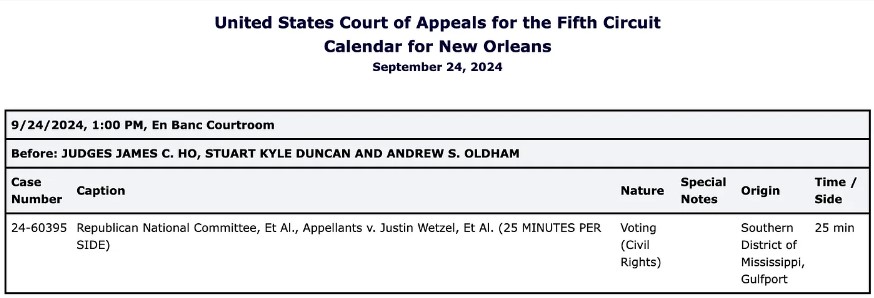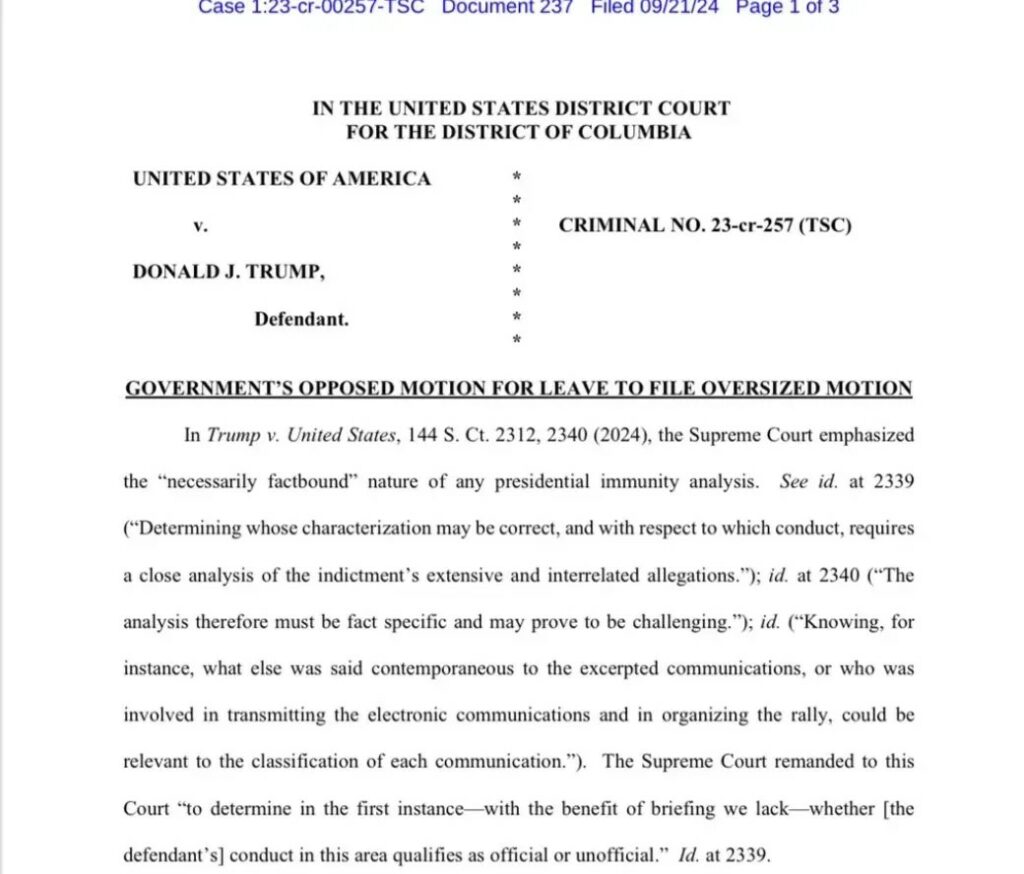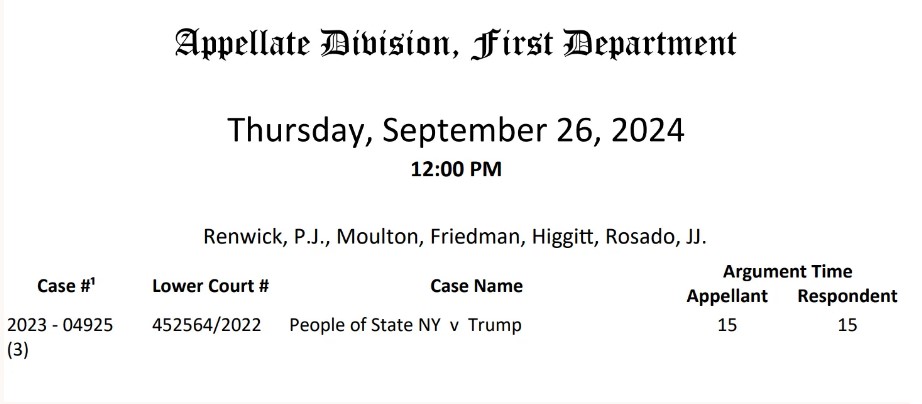Trumps Court Cases an Update by Joyce Vance Civil Discourse Just so you know, I am not kidding. This reads as a soap opera. Poor Trump so many issue . . . Full time subscriber to Civil Discourse. Hope ou enjoy his reading of he issues, ~~~~~~~ This week, two very important Legal World developments will take place. The first is a Mississippi case that could end up having a national impact. On Tuesday, the Fifth Circuit Court of Appeals will hear oral argument in RNC v. Wetzel. Mississippi counts mail-in (absentee) ballots that are received up to five business days after an election, so long as they are postmarked on or before election day. The RNC is challenging that process, arguing that extending the count “effectively extends
Topics:
Angry Bear considers the following as important: law, politics, Trump Legal World
This could be interesting, too:
Robert Skidelsky writes Lord Skidelsky to ask His Majesty’s Government what is their policy with regard to the Ukraine war following the new policy of the government of the United States of America.
Joel Eissenberg writes No Invading Allies Act
Ken Melvin writes A Developed Taste
Bill Haskell writes The North American Automobile Industry Waits for Trump and the Gov. to Act
Trumps Court Cases an Update
by Joyce Vance
Civil Discourse
Just so you know, I am not kidding. This reads as a soap opera. Poor Trump so many issue . . . Full time subscriber to Civil Discourse. Hope ou enjoy his reading of he issues,
~~~~~~~
This week, two very important Legal World developments will take place.
The first is a Mississippi case that could end up having a national impact. On Tuesday, the Fifth Circuit Court of Appeals will hear oral argument in RNC v. Wetzel. Mississippi counts mail-in (absentee) ballots that are received up to five business days after an election, so long as they are postmarked on or before election day. The RNC is challenging that process, arguing that extending the count “effectively extends Mississippi’s federal election past the Election Day established by Congress” and results in “valid ballots” being “diluted by untimely, invalid ballots.”
On its face, the argument is pretty silly. Extended mailing times are permitted for all sorts of work, including filing papers with courts, in recognition of how the world actually works. Of course, that is necessary far less often in the courts these days, as lawyers are able to upload the briefs on the day they are due directly to the court in question using an e-filing system. Unfortunately, with rare exceptions, online voting is not available, so acknowledging that a ballot cast on election day might take some time to be delivered is a pragmatic approach.
But remember, this is the Fifth Circuit, a court with a propensity for reaching maximalist results when a more narrow ruling would have served and enabling the Supreme Court to go off on a tangent, like it did when it reversed Roe v. Wade in the Dobbs case, which also came out of Mississippi. Hopefully, the panel judges, James Ho, Stuart Duncan, and Andrew Oldham—all Trump appointees—will push aside the RNC’s argument and rule in favor of Mississippi’s Republican Secretary of State, who is the defendant. But we have to contemplate the possibility that they or the Supreme Court might ultimately decided that all ballots must be both cast and counted by election day, which would make it more difficult than it already is for student voters, older voters, voters who are sick or who have disabilities, voters who must work on election day, and other voters who Republicans seem to believe are inclined to vote Democratic, to cast their ballots and have them counted.
The Justice Department has filed an amicus brief supporting extra time for Mississippi voters’ ballots to be received. They point out that this could impact whether members of the military and Americans living abroad have their ballots counted. When the district court ruled that Mississippi could continue to count late-received ballots after election day, the court pointed out that Congress has never taken steps to alter the many state statutes that impose post-election day deadlines for mail-in ballots. One hopes that the Fifth Circuit will not rush into that breach.
In the District of Columbia on Thursday, Jack Smith will file his opening brief in the effort to determine what charges and evidence are still in play in the election interference case against Trump following the Supreme Court’s immunity decision.
Local rules limit the type of brief Smith is about to file to 45 pages. Lawyers must file a request for permission before they file an “oversized brief.” On Saturday, Smith filed a motion to exceed the page limit, advising the court that his brief will not exceed 180 pages, around 30 of which involve “extensive footnote citations” to evidence in an appendix.
There are good reasons for that, given the Supreme Court’s direction to the district court to create a detailed record of the issues here, which includes four criminal charges and the voluminous evidence the government will want to use at trial to sustain them. In fact, it would be judicial malpractice for the court to refuse to let Smith air his case for her consideration as Judge Chutkan prepares to rule on what, if any of it, escapes the broad grant of immunity ordered by the Supreme Court. Smith has advised the court that the conduct and evidence he will offer in his brief goes beyond what is included in the indictment and other pleadings to date, which makes a great deal of sense. The government is not required to put all of its case into an indictment but simply to put a defendant on notice of the charges against him that he must be prepared to defend against. Additional information is revealed in the course of discovery, but frequently, some of the details do not come out until trial. Given the expansive protection the Supreme Court has granted Trump in the form of immunity, the government will want to pre-vet its evidence with the court. Ultimately, this matter is headed back to the Supreme Court for a ruling on what the jury can hear, a task they have already pointed out they cannot accomplish in the absence of a detailed factual record.
Trump’s lawyers, of course, have opposed the Special Counsel’s motion for more pages. This is a ridiculous exercise in gamesmanship, given that if Smith sticks to the page limits and omits arguments, they would cry foul or argue that anything he didn’t squeeze into the page limits couldn’t be raised down the road. They asked the court to give them until 5 p.m. Tuesday to file their opposition. Judge Chutkan filed a minute order later than evening giving them until Monday at 5 p.m.
When can we actually expect to see the brief? Typically, lawyers file as close to the deadline as possible because they are busy tweaking and proofreading down to the last minute—proof that they, too, are human. But here, Smith’s advance request for an exception to the page limits almost a week out suggests that he is mostly ready, and at least far enough along to know what the page count looks like. So we may see it earlier in the day on Thursday. Of course, we will not get to see all of the brief. Smith is going to file a request to release a redacted version to the public.
On Tuesday, the Senate Judiciary Committee will hold a hearing on the ramifications of the Supreme Court’s immunity decision, with this framing:
Concerns about the Supreme Court have not dissipated. Instead, as we draw closer to the first Monday in October when the Justices convene for the start of a new term of court, the focus on the need for, at a minimum, Supreme Court reform seems to be percolating across the government. It would take a trifecta Harris victory, taking the White House, Senate, and House, for that to be a realistic possibility.
In addition to these two cases and the hearing, there will be a brief—each side gets 15 minutes to present its case—oral argument in Trump’s appeal of the New York Attorney General’s civil fraud judgment against Trump.
This is the case before Judge Arthur Engoron, which concluded in January of this year. Donald Trump and co-defendants, including his adult sons, were ordered to pay more than $450 million in total to the state, including ill-gotten gains from decades of fraudulent business practices.







